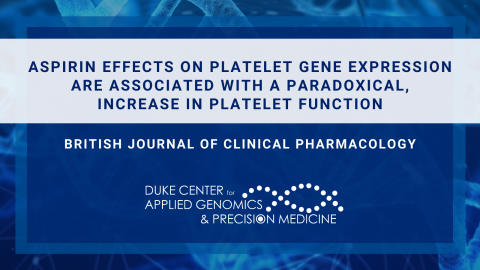
A new study by Duke researchers, including Duke Center for Applied Genomics members Deepak Voora, MD, Geoffrey Ginsburg, MD, PhD, and first author, Rachel Meyers, PhD, explores why aspirin may not work as well as expected against stroke and heart attack and to better understand any differences between low- and high-dose aspirin – one of the most commonly used medications worldwide.
The paper, “Aspirin effects on platelet gene expression are associated with a paradoxical, increase in platelet function” was published in the British Journal of Clinical Pharmacology.
74 adult volunteers were followed in the study for 4 weeks, each given 81mg/day or 325mg/day aspirin. Using mRNA sequencing of purified platelets collected before and after each 4-week exposure, researchers identified 208 aspirin-responsive genes with no evidence for dosage effects.
Compared to low-dose aspirin, the study found no major differences with high-dose aspirin with respect to platelet function or platelet transcriptome and thus no rationale for using high-dose aspirin.
In this short-term study, the researchers found that the aspirin induced changes in platelet genes correlated with higher levels of platelet activity. Patients chronically prescribed aspirin to prevent cardiovascular disease that have an accentuated platelet transcriptional response may experience smaller than expected reductions in cardiovascular risk.
“We learned that when patients take a medication like aspirin, that their platelets actively respond by changing the levels of certain genes that we think is an effort to counteract the primary effect of aspirin. Aspirin still works as a blood thinner, but there may be people where this adaptation is more robust than others” says Dr. Deepak Voora.
Furthermore, future work targeting such patients using platelet RNA biomarkers may lead to individualized decisions about the risks/benefits of antiplatelet therapy to prevent heart attacks and stroke.